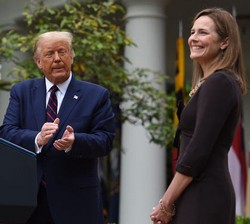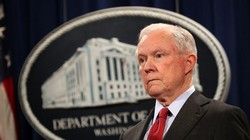Approximately 80 University students, faculty, and staff demonstrated for social justice and equality in response to the recent deaths of Eric Garner, Michael Brown, and others in front of Wilson Hall on Friday, Dec. 5 at 4 pm.
Morgan Spann, a junior communication student who organized the protest, addressed the gathering, “This is a time for you speak up and simply say, ‘I refuse.’ I refuse to let black men be reduced to nothing. I refuse to see women get torn down. I refuse to see my people exterminated before my eyes and sit back and do nothing. I refuse to be a statistic.” Spann said she wanted to channel her anger over the recent tragedies and transform it into a positive movement. “This is the time for unity,” she continued.
Racial tension in America has been exacerbated by the parallel coverage of Garner, an African American male from New York who was placed in an apparent choke hold during his apprehension, and Brown, an 18-year-old Ferguson resident who allegedly shoplifted some cigarillos before being shot by a police officer. People across the nation have called into question the use of excessive force by police officers when taking individuals into custody, particularly African American males.
Considering the deaths of Brown and Garner occurred within less than a month of each other, protesters have come together in an effort to bring attention to both deaths.
The first 30 minutes of the protest was open to speeches from anyone that was in attendance. Some speakers included: Faith Blamon, a junior biology student; Barbara Arrington, a specialist professor in the school of social work; Mukunda Alladi, a senior accounting student; and Khamiya Smith, a graduate student in the school of social work.
Smith recited a portion of a lecture given by Angela Davis, an American political activist, scholar, and author. She quoted, “We are four decades removed from the era of the sixties which is an era universally remembered for radical and revolutionary activism. Being at historical distance however does not extricate us from the responsibility of defending and indeed liberating those who were and still are willing to give their lives so that we might build a world that is free of racism and imperialist war and sexism and homophobia and capitalist exploitation.”
Smith reflected on Davis’s words and transitioned by saying, “Before we can begin to question what is happening as a world, we must first have an understanding of human rights, social justice, and what these words mean. We can’t question a system that you yourself don’t know. You can’t fight for rights that you yourself don’t even know you have the right to fight for.”
At approximately 4:30 pm the dynamic then shifted from staying stationary on the steps of Wilson Hall to instead marching around campus. Protestors made their way to the Rebecca Stafford Student Center (RSSC) and then to the residential side of campus all while chanting, “Wake up, MU,” “Know justice, know peace,” “Hands up, don’t shoot,” and “I can’t breathe.”
After the march, Spann urged students to sign a “Wake up MU” banner as well as a petition that Blamon created and circulated to indict NYPD officer Daniel Pantaleo, the officer responsible for Garner’s death. According to Blamon, the petition received approximately 60 signatures from the student body. The petition to-date has 92 signatures.
Johanna Foster, an assistant professor of political science and sociology, said, “As a white woman who has always had relative social advantages, I understand how privilege works, and I feel morally obligated to do my part to change the systems of inequality that have benefitted me unfairly.” As a sociologist of inequality, Foster has spent more than twenty years actively studying how oppression operates. “I understand that social inequality is not simply a thing of the past, or just a current problem of some vigilante bigots. Racism is individual, yes, but also institutional.”
Rebecca McCloskey, a specialist professor of social work, said, “If you look at the history of human rights in our country, it was people, groups of people, coming together who were responsible for making positive change. Our traditional systems of justice are not working, so we have to change these systems and the culture that fuels them. And it’s up to all of us. Only us every day, ordinary people can do this, together.”
Dr. Walter Greason, a lecturer of history and anthropology, said that learning from Ferguson has yet to begin, as the public is still in shock from the Grand Jury’s Decision. In moving forward, Greason suggested, “The millions of people worldwide who have taken the disciplined actions to protest through boycotts must now turn their energy to sustained efforts to change their local governments and to create new businesses in their communities.”
Andrew Colucci, a graduate student in the anthropology program, said, “If Ferguson has taught us anything it is that this country still suffers from serious issues of race.” Colucci noted that whether Officer Wilson was right to shoot Brown, the American public will continue to frame the issue along racial boundaries.
He continued, “While institutionalized discrimination still exists, such protests has called into question the ‘ethicacy’ of the entire law enforcement system of the United States, a move which could prove disastrous for public order throughout the country as people begin to question the moral character of every law enforcement official.”
According to Spann, the protest held at the University was organized in only a two-day span. In order to advertise and increase campus involvement, a flyer was crafted and posted on social media sites including Instagram and Twitter using the hashtag #WakeUpMU. The flyer read, “Let’s stamp out ignorance here at Monmouth University. Come out and march with us… to alert the Monmouth U community of all of the social issues going on in our country. Let’s make a mark and be heart. Bring your voice, your courage, and your sign.”
The junior also reached out to Heather Kelly, Assistant Director of Student Activities for Multicultural and Diversity Initiatives, who then sent out an email to the campus community as an invitation to join the protest on Friday, Dec. 5 at approximately 9:48 am on behalf of Spann.
This is not the first protest that has been organized on campus calling for immediate action in revamping our nation’s justice system, according to Foster. The women of Alpha Kappa Alpha (AKA) Sorority, Inc. also organized a protest in front of Wilson Hall after the Ferguson Grand Jury’s decision not to indict Darren Wilson for the killing of Brown on Tuesday, Nov. 25.
Mary Anne Nagy, Vice President of Student Life and Leadership Engagement, said, “I think it is always good to see on a college campus people coming together to share their disparate points of view. Campus should be a place where free speech is embraced.”
McCloskey said the world needs to hear a message of dignity and humanity. She commented, “If we can focus on these things, which human rights were created upon, we will find the truth and the way to achieve justice. We’ve become far too disconnected from one another. If we truly saw, respected, and understood each individual person’s humanity and individuals’ inherent dignity and worth we would have more compassion toward one another in all interactions.”
McCloskey believes that we need more compassion to prevent such “horrific atrocities” as well as to create the kind of world that we all really wish to see.
Danielle McKeown, a junior psychology and sociology student and attendee at the protest, said, “I think the country needs to adjust its cultural narrative to be accepting of humans. Because at the end of the day, human lives matter – all of them.”
Colucci, however, added that the coverage of recent “police brutality” and “racial discrimination” has saturated media outlets with opinions, educated or otherwise. “The news networks and social media outlets played two crucial roles in this whole series of events,” he said. “Firstly, they disseminated information globally in a short period of time. Secondly, they exacerbated already high-strung emotions by continuously harping on the issue, spreading discontent through the country by allowing anyone with an opinion, educated or not, to garner support for whatever side they believed in.”
The University’s movement for social justice will continue at the National March Against Police Violation in Washington D.C. on Saturday, Dec. 13. Foster invited members of the University community to join her as she makes her voice heard in these national efforts to promote racial justice. She said, “I also know that racial oppression is not simply a thing we have to accept as part of human life. We also know from history that it is absolutely in our power to change it, and I want to be part of that change.
Greason said that learning from the shooting will begin if the “American public can emerge from the holiday season with a commitment to save money, demilitarize the police, and ultimately end police killing, especially in black communities.”
“No one should settle for being comfortable. It bothers me to hear people say, ‘Well stuff like that happens every day, we should all expect.’ Or, ‘This is how it’s going to be. Just get used to it,’” said Spann. “Once you change your vocabulary, once you stop believing violence, prejudice and inequality are ‘normal,’ and once you raise your voices, then change will come.”
IMAGE TAKEN from www.democratandchronicle.com



